Bedrock of Success: Female Earth and Environmental Sciences Scholars Carry on a Legacy of Mentorship
EES Professor Linda Ivany ’88 and her former graduate student Christy Visaggi G’04 were recently recognized by the Association for Women Geoscientists for their excellence in research and teaching.
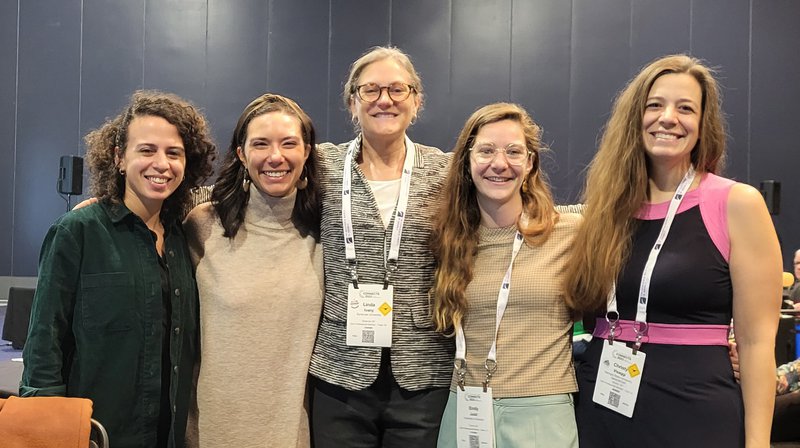
A&S professor Linda Ivany (center) at the AWG award ceremony with former members of her lab including: (from left) Marie Jimenez G’18, Lindsay Moon ’19, Emily Judd G’20 and Christy Visaggi G’04.
In Syracuse University’s Department of Earth and Environmental Sciences (EES), women have served as leaders and mentors dating back to the early 1980s, a time when the field was predominantly comprised of men.
The legacy of high-impact research and stewardship by women came to the fore beginning in 1983 with the hiring of Professor Cathryn R. Newton. A leading expert in the study of modern and ancient biodiversity, her work on one of the major mass extinctions pushed researchers to examine the fossil record for clues to the catastrophic causes for extinction in the history of life. Newton was the first woman to be named chair of the department (1993 to 2000) and was the first woman to serve as Dean of A&S (2000 to 2008). During her time at Syracuse, she has been an ardent advocate and mentor to women in the sciences, co-founding the University’s Women in Science and Engineering (WiSE) program.
Among Newton’s early advisees was an undergraduate student named Linda Ivany '88. Ivany, now a professor at Syracuse herself, majored in geology and minored in zoology (now biology). She graduated at the top of her class and was named a Syracuse University Scholar, an honor conferred to high-achieving seniors.
A Trailblazer in Her Field
After graduating from Syracuse, Ivany continued her academic focus on paleontology – the study of life’s deep history and evolution. It was during her time as a graduate student at the University of Florida-Gainesville where she became aware of the lack of equal representation among paleontologists.
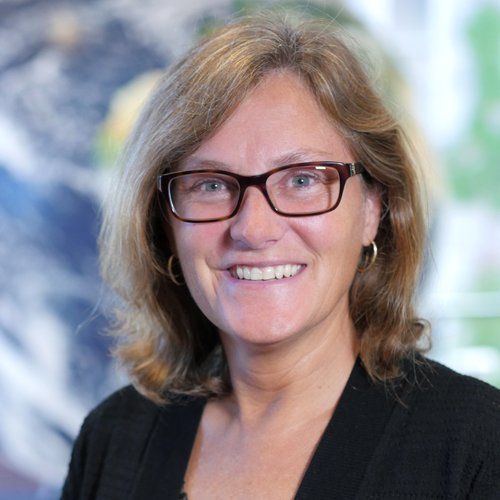
“As an undergraduate at SU, I didn’t realize how rare and special it was to have a woman advisor – and a formidable one - in the geosciences at that time. Once I got to graduate school, it became abundantly clear that there were very few senior women in the field, and that they generally didn’t get the recognition they deserved for the work they were doing,” she says.
But this never discouraged Ivany. After graduating from the University of Florida-Gainesville with a master’s degree, she attended Harvard University where she received a Ph.D. in Earth and planetary sciences, studying with noted paleontologist Stephen Jay Gould. After a fellowship at the University of Michigan, she returned to Syracuse University as a professor, following in the footsteps of her mentor, Cathryn Newton. That year, in 2000, she joined Professor Suzanne Baldwin as the second and third woman to be hired into the faculty of EES at Syracuse. Over the past two decades, Ivany has served the department as director of undergraduate studies and associate chair.
A proven leader in her field, Ivany has authored or co-authored more than 60 pivotal papers. Her recent work uses geologic and fossil evidence to estimate ancient climate conditions and study how life responds to environmental change. The chemistry and growth banding in ancient mollusk shells reveals past seasonal temperatures that Ivany uses to test the accuracy of climate models and provide insight into what to expect in a future warmer world. These same data enable her to study the evolution of lifespan and growth, and she has worked on how marine ecosystems responded to environmental change, including global warming, millions of years ago.
A devoted researcher, professor and advisor, Ivany has received numerous recognitions for her accomplishments at the University, including the Excellence in Graduate Education Faculty Recognition Award in 2019. For her innovative work in the field and the classroom, Ivany was also featured in an exhibit titled Daring to Dig at the Museum of the Earth in Ithaca, NY, in 2021. The gallery highlighted the careers of women paleontologists, reflecting on their challenges and triumphs.
Adding to her list of teaching accomplishments, Ivany recently received an Outstanding Educator Award from the Association for Women Geoscientists (AWG). With over 1,000 members, AWG aims to enhance the quality and level of participation of women across the geosciences and introduce girls and young women to geoscience careers.
“I am extremely humbled to receive the Outstanding Educator Award,” says Ivany, who has served as advisor to seven Ph.D. students, 12 M.S. students and 20 undergraduate students at Syracuse. “An award for outstanding educator is especially meaningful to me because it feels like I’ve somehow been successful at giving back, at honoring the educators and mentors who were so influential for me when I was a student.”
Encouraging Future Generations
Just as she drew inspiration from Cathryn Newton, Ivany has played a key role in encouraging the next generation of paleontologists. Evidence of her educational impact was on full display at the AWG award ceremony in October as four of her former students attended the event to support their mentor. Among them was Christy Visaggi, who was also being honored by the AWG with the Mavis Kent Mid-Career Excellence Award. Visaggi received an M.S. at Syracuse in 2004 and is now a principal senior lecturer and undergraduate director in the Department of Geosciences at Georgia State University in Atlanta.
“I was so touched,” says Ivany. “It was incredibly special that Christy was being recognized at the same event with a mid-career excellence award. She was the very first graduate student I recruited when I got to SU, and I’m so proud of her accomplishments.”
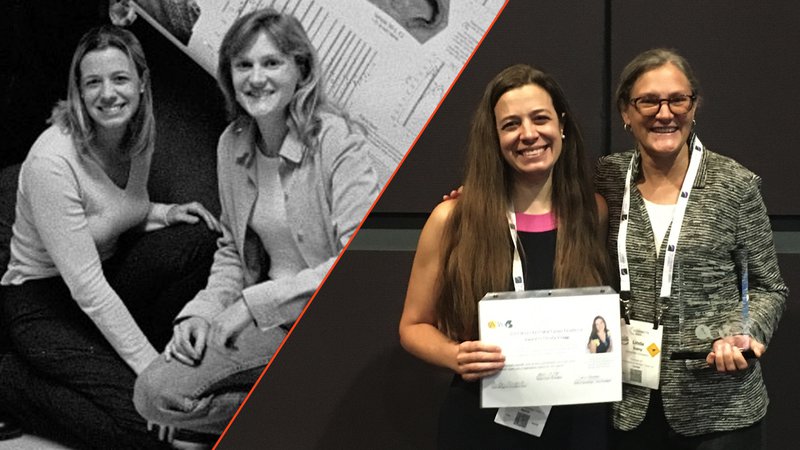
Side by side photos of Christy Visaggi (left in both) and her mentor, EES Professor Linda Ivany. The image on the left is from 2003 in the Heroy Geology Building and the image on the right is from the 2023 Association for Women Geoscientists annual meeting.
Visaggi was an undergraduate student at Colgate University when she first met Ivany, who was giving a guest lecture to her class. Visaggi was immediately drawn to her enthusiasm, passion for the subject and approachable demeanor. When it came time to choose a graduate school, she wanted to find a place where researchers were studying ancient marine life, and she says she was fortunate to be accepted into Ivany’s lab.
“It felt amazing to know that she wanted to work with me and guide me in my next steps,” says Visaggi. “I felt that support throughout my time at SU and still do now, 20 years later. She was everything that I needed in a mentor at that time of my life. She challenged me in my research, gave me opportunities to grow as an educator, and helped me navigate personal and professional challenges.”
After graduating from Syracuse, Visaggi received a Ph.D. in marine biology from the University of North Carolina Wilmington and has served on the faculty at Georgia State for the past decade. In her research, she uses the fossil record and modern marine habitats to better understand ecological interactions. She is also deeply committed to enhancing geoscience education, both in K-12 and higher education.
In addition to her award from the AWG, Visaggi has received numerous recognitions for her teaching and research excellence. Among them are the Biggs Award for Earth Science Teaching from the Geological Society of America’s Geosciences Education Division, the 2022 Dorothy LaLonde Stout Award from the American Geophysical Union and several awards from Georgia State, among them the GSU College of Arts and Sciences Outstanding Undergraduate Mentoring Award and the GSU Signature Experience Teaching Award. She also notably served as President of the National Association of Geoscience Teachers.
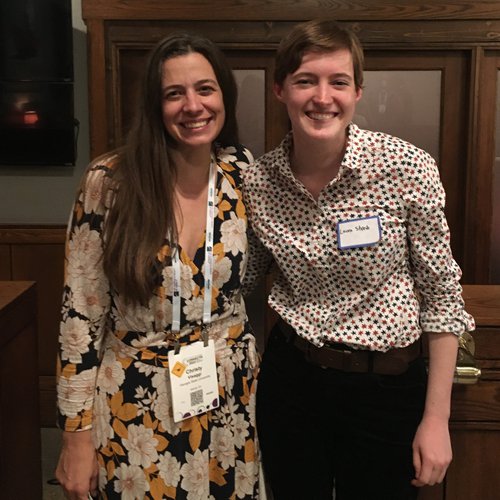
Visaggi attributes much of her passion as a researcher and educator to the mentorship of Ivany, who always urged her to push forward when faced with challenges and to seek answers to complex questions.
“Professor Ivany always supported me and my goals, and continuously encouraged me to do more and pursue new opportunities, including after I graduated,” says Visaggi. “She encouraged me to join the Association for Women Geoscientists, which has been wonderful for many reasons, including landing my first internship with the National Park Service (NPS) a year after I graduated from SU.”
Visaggi is still working with the NPS today because of that internship, and she has developed a new program for paleontology students to gain experience working with the NPS.
For Visaggi, Syracuse University holds a special significance on both a professional and personal level. As a researcher, she gained invaluable experience learning how to prepare her work for publication and write successful grant proposals to support her fieldwork. On a more personal level, her geology officemate at Syracuse, a fellow graduate student at the time, is now her husband.
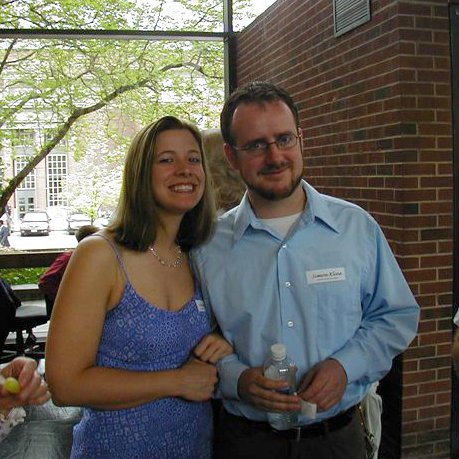
Christy Visaggi with her future husband Simon in the lobby of the Heroy Geology Building in 2004 when she received the Newton E. Chute award for Excellence in Graduate Studies.
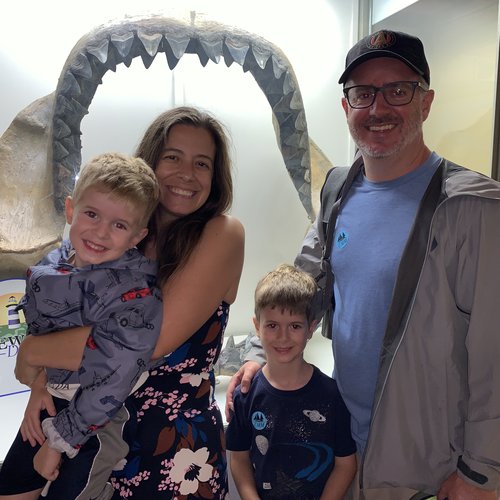
Christy and Simon nearly 20 years later with their two children at the Calvert Marine Museum in Maryland.
“We have two kids and enjoy sharing our love of the natural world with them, so as you can see, all aspects of my journey as a person and professional were greatly influenced by my time at SU and the mentorship of Professor Ivany,” says Visaggi.
The key to engaging students in science, according to Visaggi, is by lighting what she calls a scientific spark. “Getting students excited about what they are learning or inspiring them to do more in navigating their own journey... it’s all incredibly fulfilling,” she says. “Gaining confidence in public speaking, landing an internship valuable for your career... these are things that Professor Ivany helped instill in me and I consider myself lucky to pass them along to other aspiring scientists on their path.”
Featured
Linda Ivany Professor and Director of Undergraduate Studies: Evolutionary Paleoecology and Paleoclimate
